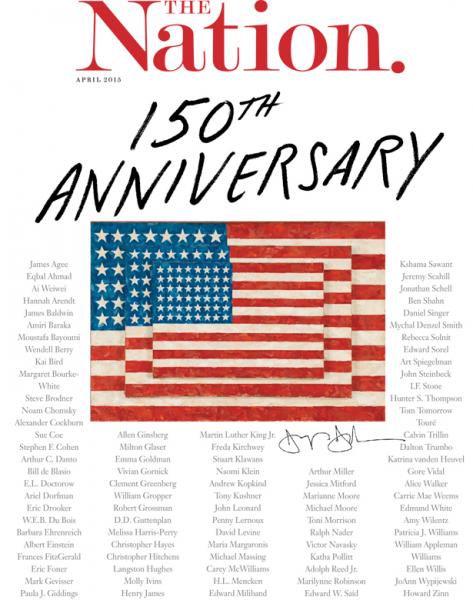‘The Nation’ Celebrates Its 150 Year Anniversary With A New Documentary

The documentary takes us deep into the lives of the writers, editors, and even the interns, who make up the The Nation’s staff past and present. We are given the chance to observe the process it takes to create meaningful stories as we follow Sasha Abramsky to Texas, Amy Wilentz to Haiti, and John Nichols to Wisconsin. Between these contemporary examples of The Nation’s continued commitment to journalism with integrity, we are thrust back into the history of the progressive publication, which has an impressive roster of contributing writers such as Albert Einstein, Martin Luther King Jr., Hunter S. Thompson, and Toni Morrison to name a few.
There is a seamless juxtaposition of the old and new stories covered by The Nation which reminds us that history always repeats itself. One example is the unsettling, yet accurate comparison drawn between the Voting Rights Act of 1965 and, 50 years later, the restrictive voting legislation that continues to disenfranchise African-American voters in the South today.
The film begins with a clever montage featuring many particularly significant magazine covers of The Nation’s past. We learn of The Nation’s evolution as a publication. Founded by Republican abolitionists in 1865, The Nation would ultimately become a leading voice in liberal America during the New Deal era under President Roosevelt.
SEE ALSO: 'Going Clear' And The Future Of Scientology
With their 1865 founding prospectus stating: “[The Nation] will wage war upon the vices of violence, exaggeration, and misrepresentation by which so much of the politic writing of the day is marred,” it is no wonder that The Nation has long been characterized by its unique advertising policy and its independence from corporate financing — a topic which is explored in detail throughout the film. Editor emeritus Victor Navasky claims that this policy allowed The Nation to break huge stories in the past such as the link between cigarette smoking and cancer, and Ralph Nader’s unmasking of our unsafe cars. Navasky notes that it is no surprise that a publication without cigarette or automobile advertisements broke these two important stories.
But what the documentary does best is provide human faces and real stories behind the words of those who make up The Nation. Twenty-year editor & publisher Katrina vanden Heuvel is one of the film’s stars, and the face of The Nation who has been featured on numerous talk shows including “The Daily Show,” ABC’s “This Week,” and “The Colbert Report.” Katrina vanden Heuvel’s immense passion for providing thought-provoking and unhindered journalism makes it clear to viewers why she became the publication’s editor-in-chief.
The Nation’s executive editor Richard Kim is another stand-out character in the film, providing the more playful side of life as a journalist, including a few funny comments pertaining to his lack of interest in traveling to Tampa to cover the Republican National Convention. These few anecdotes that capture the day-to-day activities of The Nation’s staff serve as both enjoyable and necessary, showing us that this is a group of people we would love to get a drink with.
SEE ALSO: 'The Intern's Handbook' Author Shane Kuhn Talks Sony Movie Deal, Prior Internships
Following the screening, there was a short Q&A session between Katrina vanden Heuvel, Barbara Kopple, Sasha Abramsky, and Amy Wilentz. The group briefly discussed the making of the film and the future of The Nation before informally chatting with audience members during the post-show mixer held in the Hammer Museum courtyard. Audience members were all given a free copy of The Nation’s 150th Anniversary issue, which features a comprehensive look into The Nation’s long-standing legacy.
One of the ongoing themes in both the film and the post-show discussion, was the desire to attract younger readers to the publication. The documentary included a scene from an editorial meeting in which it is highlighted that a vast majority of The Nation’s subscribers are over 60. Unfortunately, this event was no exception, with myself and a few others standing out as being under 25. But as the political landscape grows increasingly hostile, and marginalized groups continue to be under attack, it is my hope that my fellow millennials will soon learn to value those publications who are not afraid to speak truth to power.
“Hot Type: 150 Years of The Nation” was a one-night only event at the Hammer Museum’s Billy Wilder Theater. For more information about upcoming events, visit Hammer.ucla.edu.
To learn more about The Nation and their 150th Anniversary, visit TheNation.com.
Contact Theater Editor Savannah L. Barker here.



